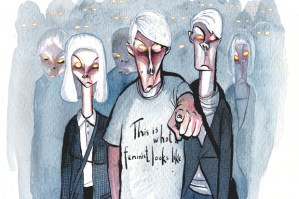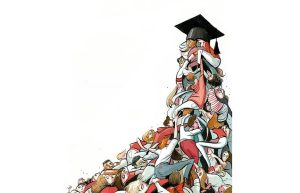Student journalists at Northwestern University apologized for doing journalism on Sunday.
In response to complaints by student activists over their coverage of Jeff Sessions’s recent visit to campus, the staff of the Daily Northwestern apologized for causing ‘harm’ to their fellow students in a recent editorial. Among their supposed transgressions, the reporters posted pictures of protesters to social media, which was ‘retraumatizing and invasive’, and committed an ‘invasion of privacy’ by contacting students for interviews.
Why apologize for standard journalistic procedures? The editors offered this reasoning:
‘We feel that covering traumatic events requires a different response than many other stories. While our goal is to document history and spread information, nothing is more important than ensuring that our fellow students feel safe — and in situations like this, that they are benefitting from our coverage rather than being actively harmed by it.’
To be expected, journalists on social media are rebuking the editorial. And though the students deserve criticism, they might benefit from some sympathy as well.
In an interview with the Washington Post, Daily editor-in-chief, Troy Closson, explained that a difficulty with student journalism is that young reporters often ‘have to go to class’ with the subjects of their articles. In the local bubble of a college campus, social pressure and backlash can be potent. Lacking appropriate distance from student activists, the staff of the Daily misjudged their demands as good-faith feedback and abandoned their journalistic principles.
While this social pressure may seem harmless, it can have real negative consequences for a student paper. Recently, student activists at Harvard targeted the Harvard Crimson for simply contacting Immigration and Customs Enforcement for comment in an article.
Although the editors of the Crimson have the backbone to stand by their reporting, several student organizations — including Harvard College Democrats — are boycotting the newspaper until it acquiesces to activist demands. The Harvard student government passed a resolution on Sunday to express ‘solidarity’ with the student activists and ‘marginalized individuals on campus’.
Though the Crimson has to fend for itself, the Daily Northwestern benefited from institutional support. In a recent statement, the dean of Northwestern’s Medill School of Journalism, Charles Whitaker, defended the Daily’s original reporting on the Sessions event and accused student activists of ‘bullying and badgering’ Daily staff members, noting that the young journalists ‘were beat into submission by the vitriol and relentless public shaming’ of student activists.
In an essential statement, Whitaker writes what the student journalists were too afraid to express themselves:
‘But regardless of their own identities, our student journalists must be allowed — and must have the courage — to cover our community freely and unfettered by harassment each time members of the community feel they have been wronged.’
For student journalists and activists, it can be difficult to look beyond the self-contained world of a college campus. Luckily at one of the country’s best journalism schools, there is an adult in the room to offer some perspective.



















